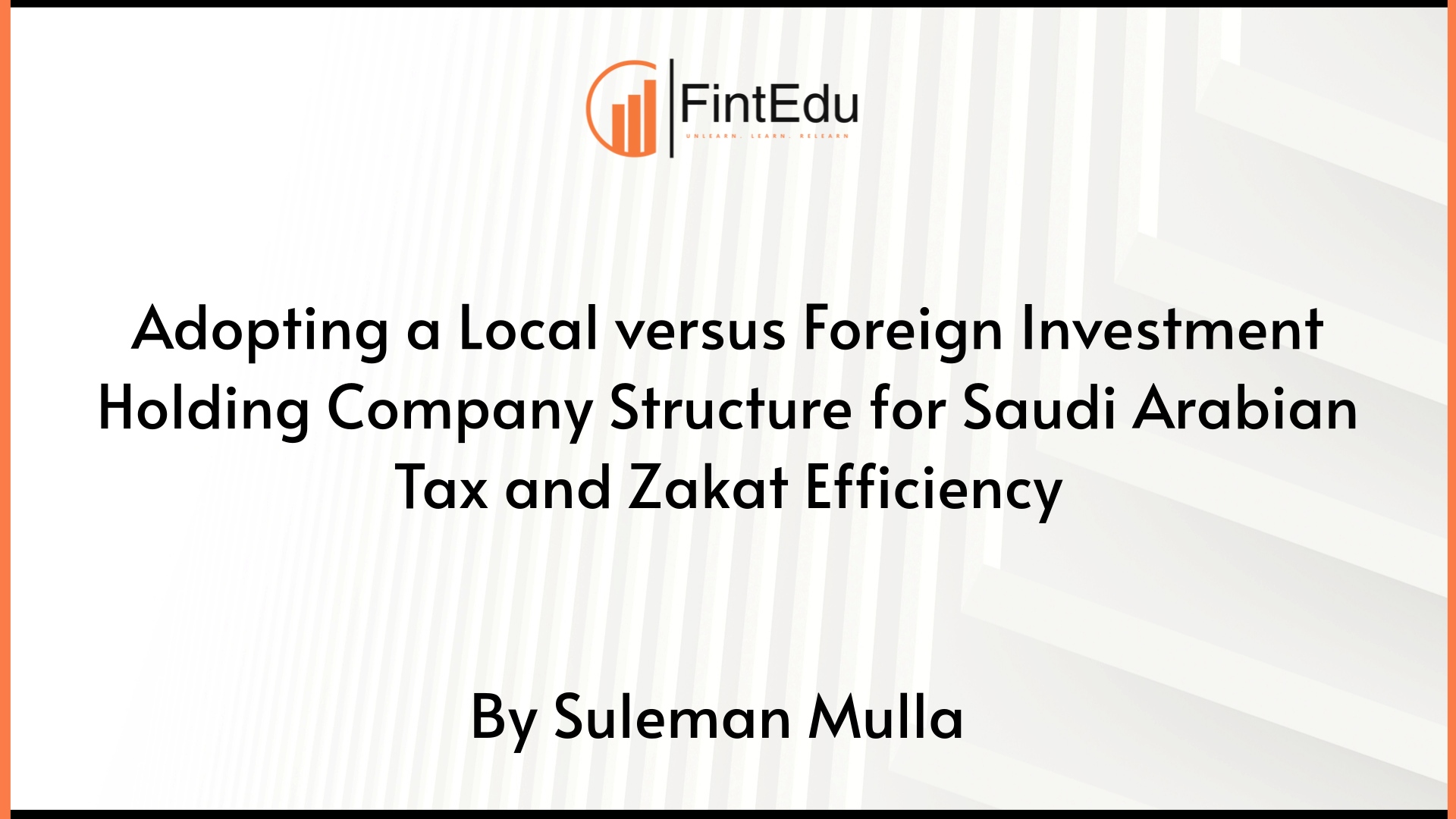LISTEN TO THIS ARTICLE
As companies expand their operations into Saudi Arabia (KSA), understanding the Place of Effective Management (POEM) is vital for determining tax residency, which directly affects both corporate income tax and zakat liabilities. POEM is influenced by factors such as board meetings, executive decision-making, and revenue generation, and its determination can subject a foreign entity to KSA's tax laws. This includes worldwide income taxation, compliance with KSA regulations, and potential dual taxation challenges. Additionally, KSA’s transfer pricing guidelines and economic substance requirements add complexity, potentially affecting tax treaty benefits and increasing administrative burdens.
This article builds upon Place of Effective Management (POEM) and its impact on taxes. Here, we explore the benefits and considerations of using a unique holding company structure for Saudi Arabian investors. This involves the use of a local KSA holding company (HoldCo) for investments within Saudi Arabia (KSA); and a foreign HoldCo for investments outside the country, an approach adopted by some KSA family groups and KSA corporates with diversified local and international investment portfolios.
This structure usually provides for a ‘parallel’ governance structure to manage the local versus foreign investments. Let us have a look at some of the benefits/ issues of adopting such an arrangement from a KSA perspective.
Local KSA Holding Company for Saudi Arabian investments
1. Zakat/ Tax Benefits : KSA applies corporate tax at a 20% rate for non-Saudi investors, while Zakat at 2,5% applicable to Saudi shareholders. A local HoldCo avoids potential double taxes on investment income, no withholding tax on dividends paid to shareholders and possibility to mitigate capital gains tax on exit.
- For Zakat only entities, the option to consolidate and file one Zakat return, may allow for efficiencies. Separate subsidiaries for long versus short term investments also allows for possible Zakat optimization.
- From an indirect tax perspective, possible grouping of local HoldCo and local subsidiaries for VAT purposes provides for tax compliance benefits.
2. Asset Protection : A local KSA HoldCo may provide a layer of protection for assets, separating them from operational risks associated with businesses both locally and internationally i.e. real estate, equity investments, listed shares and start up or venture capital arrangements.
3. Easier Compliance : Operating through a local entity may simplify compliance with local regulations, including licensing and reporting requirements. For family groups, use of a Family Office to support either single or multi family arrangements may also allow be useful.
4. Investment Opportunities : A local HoldCo can provide access to exclusive investment opportunities available only to local entities. It may also facilitate government contracts and partnerships.
5. Legal Issues : The legal benefits would vary depending on sector, industry and risk appetite of stakeholders, therefore allowing for some level of protection for local investments vis a vis foreign investment.
6. Tax Incentives : Depending on the sector or industry, there may be specific tax incentives or exemptions available for local HoldCos, especially in areas that the government is trying to promote.
Foreign Holding Company for Investments Outside KSA
1. Tax Efficiency : By establishing a foreign HoldCo, you can take advantage of favorable tax treaties between the foreign jurisdiction and other countries, potentially reducing withholding taxes on dividends, interest, and royalties.
2. Capital Gains Tax : In some jurisdictions, capital gains from the sale of investments may be tax-exempt or taxed at a lower rate. This can be beneficial for a HoldCo focused on portfolio investments.
3. Diversification : A foreign HoldCo allows for diversification of investments across different markets and sectors, which can mitigate risks associated with any potential economic fluctuations in KSA.
4. Currency Management : Holding investments in different currencies can provide a hedge against currency risk, especially if the foreign HoldCo invests in stable or appreciating currencies.
5. Strategic Location : Setting up a HoldCo in a jurisdiction known for its favorable regulatory and tax environment (like UAE, Luxembourg, Ireland, Switzerland Netherlands, Malta, Cyprus or Singapore) can provide additional benefits such as ease of doing business and access to international markets. Noting that locations such as, Jersey, Cayman, Guernsey, BVI, Delaware, Hong Kong among others have been and continue to be used for various legal, commercial and tax purposes as HoldCo jurisdictions as well.
6. Privacy and confidentiality : Offshore HoldCo often provide higher financial privacy and confidentiality, allowing businesses to protect their sensitive financial information. With the move towards global tax transparency, country by country reporting and other international disclosure mechanisms, this aspect may not be a high priority any more.
Considerations:
1. Regulatory Compliance : Both local and foreign holding companies must comply with the regulatory frameworks of their respective jurisdictions. This may involve maintaining proper accounting records, conducting audits, and filing tax returns. Don’t forget about the global minimum tax and Pilar 2 issues!
2. Transfer Pricing : Be mindful of transfer pricing regulations when dealing with related-party transactions between the local and foreign holding companies. Ensure that transactions are conducted at arm's length to avoid tax disputes. Applicable to a KSA or Foreign HoldCo!
3. Substance Requirements : Most jurisdictions have implemented rules requiring that holding companies demonstrate sufficient economic substance (like employees, office space, etc.) to qualify for tax benefits. Remember the POEM!
4. Tax Treaties : Review tax treaties between KSA and other countries to ensure optimal tax treatment for cross-border investments.
Conclusion:
Always seek professional legal and tax advice to tailor the structure to your specific needs and ensure compliance with all relevant laws and regulations. By leveraging a two-tier holding (local versus foreign) company structures, investors can potentially optimize returns while minimizing tax liabilities and mitigating risks associated with investments in both domestic and international markets.
Disclaimer: Content posted is for informational and knowledge sharing purposes only, and is not intended to be a substitute for professional advice related to tax, finance or accounting. The view/interpretation of the publisher is based on the available Law, guidelines and information. Each reader should take due professional care before you act after reading the contents of that article/post. No warranty whatsoever is made that any of the articles are accurate and is not intended to provide, and should not be relied on for tax or accounting advice
Contributor
Related Posts

@@PLUGINFILE@@/Reconsidering%20the%20Use%20of%20Big%204%20Firms%20in%20Saudi%20Arabia%20%20A%2...
Read More
@@PLUGINFILE@@/The%20Role%20of%20AI%20and%20Emerging%20Technology%20in%20Tax%20and%20Zakat%20i...
Read More
@@PLUGINFILE@@/The%20King%20Abdullah%20Financial%20District%20%28KAFD%29%20in%20Riyadh%20Posit...
Read More